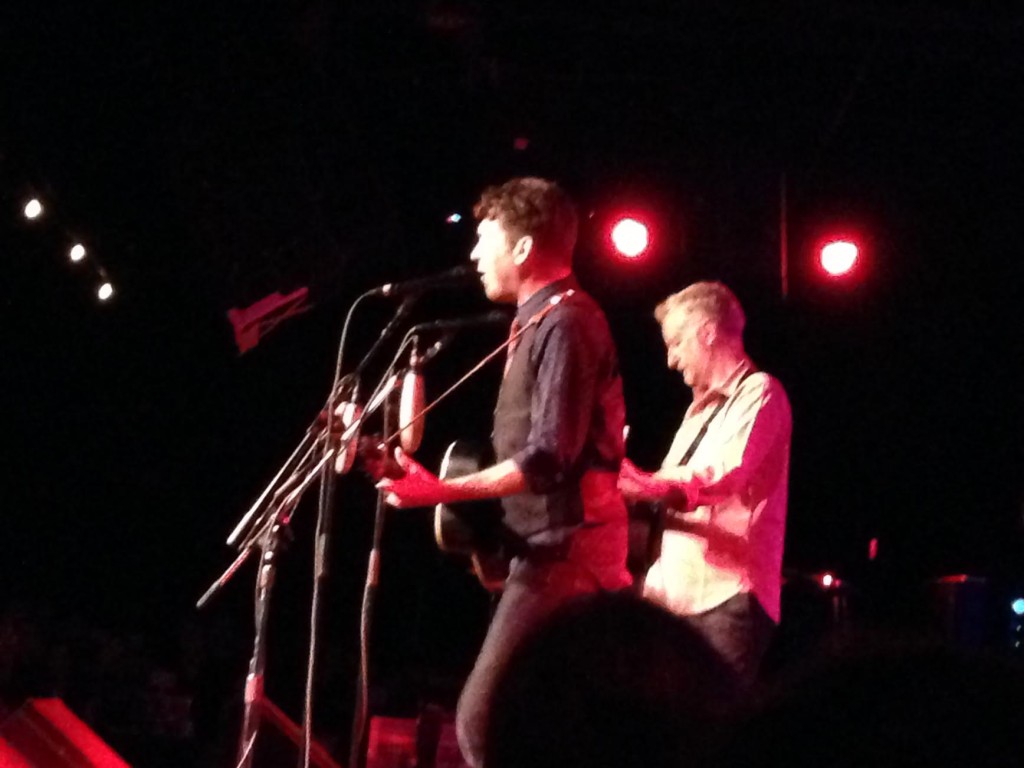 Capping one of the more remarkable concept recordings of 2016, the next phase of Billy Bragg & Joe Henry’s celebration of the U.S. train system, “Shine a Light: Field Recordings from The Great American Railroad” is a U.S. tour that started Wednesday at the Birchmere in Alexandria, Va.
Capping one of the more remarkable concept recordings of 2016, the next phase of Billy Bragg & Joe Henry’s celebration of the U.S. train system, “Shine a Light: Field Recordings from The Great American Railroad” is a U.S. tour that started Wednesday at the Birchmere in Alexandria, Va.
The two seemed a little startled to see so many people. After all, there seemed little passerby interest when they had recorded their collection of classic train songs just last spring, while on board the Texas Eagle from Chicago to Arkansas through Texas and then on the Sunset Limited up to Tuscon to Los Angeles. In addition to recording while they rolled along, they set up inside grand old train stations, alongside the track or inside hotel rooms nearby (the same one, in San Antonio, where Robert Johnson first recorded).
It’s a lovely and evocative set of songs, of course, from Lead Belly and Jimmie Rodgers (“The Singing Brakeman”) to the Carter Family and Woody Guthrie, whose lyrics Bragg had previously put to song in his “Mermaid Avenue” project with Wilco. Still, when they did their recordings, they said they had next to nobody stopping to listen.
In concert, Bragg’s deep British baritone works as well on these old songs as they did old labor tunes, standing out on things like Jean Ritchie’s “The L&N Don’t Stop Here Anymore” and “John Henry.” He brings a steady authority and empathy for the bypassing era.
Henry, who may have started this project as producer but elevated to co-singer and guitarist adds key harmonies and intricate strumming. Their singing together lessens the loneliness of the troubadour traveling by rail.
For whatever reason, Henry harmonizing with Bragg worked much better than when their roles were reversed. Bragg’s deep harmonizing didn’t quite mesh with Henry’s keening lead. But they were equal in their passion for this sometimes forgotten mode of transportation.
When Bragg yodeled at the end of “Waiting for a Train,” he said it was the first time an Englishman tried to yodel on a record since Morrissey’s “The Boy with the Thorne in his Side.”
Fans who arrived almost to a person by car (the Metro commuter train being too far to be convenient) might have been relieved that there was time for each to have their own little set mid-show to showcase a handful of their own songs.
Henry for his part included such evocative pieces of Americana as “Odetta” and his vision of Willie Mays in “Our Song,” not to mention his terrific “Trampoline.”
I regret that Bragg didn’t bring an electric guitar (seen here perhaps as the locomotive’s diesel to the more authentic steam), but he got reaction to things from “Kings James Version” to “Accident Waiting to Happen.”
His strongest song may have been one he didn’t write. “Why We Build a Wall” is a blunt song easily adaptable to the political season, from New England singer/songwriter Anais Mitchell. Bragg did a great version.
His “I Keep Faith” certainly resonated with their celebration of the rail, which he said connected the country way more powerfully than the internet, a system that still carries 42 percent of the nation’s freight and has no equivalent romance in the U.K. (where he said they sang sea shanteys about getting away rather than dream of hopping a freight).
It’s true that a lot of train songs have to do with hearing the wail of the train whistle at night, the travel and other lands it portends, and its especially aching meaning to those in prison. As a result of all their musicological study, they found that the meaning behind “The Midnight Special” (a song that Lead Belly adopted from another) was that when the train’s front light shone on a prison yard while circling a bend, if it landed on you, you’d be up next for parole.
While a lot of train songs naturally echo the driving rhythms of locomotion, there was little of that in the show whose songs by and large took on a slower reading. An exception might have been a call-and-response version of “Rock Island Line.”
With literally hundreds of train songs to choose from it was surprising to hear what their more contemporary choices were. Gordon Lightfoot’s “Early Morning Rain” was more about a plane; John Hartford’s “Gentle on My Mind” was merely sung from a railroad yard. One song they recorded but didn’t put on the album was of Bob Dylan’s “Tonight, I’ll Be Staying Here With You,” whose protagonist hears “that whistle blowin’” and throws away his ticket.
The duo’s “Shine a Light” tour may not singlehandedly save the railroad in America, but it will certainly underscore its historical and cultural legacy as it chugs along.
The setlist for Billy Bragg and Joe Henry Wednesday was:
- “Railroad Bill”
- “The L&N Don’t Stop Here Anymore”
- “John Henry”
- “In the Pines”
- “Early Morning Rain”
Joe Henry solo:
- “Odessa”
- “Trampoline”
- “After the War”
- “Our Son”
- “Eyes Out for You”
Billy Bragg solo:
- “Nobody Knows Anything Anymore”
- “King James Version”
- “Accident Waiting to Happen”
- “Why We Build the Wall”
- “I Keep Faith”
- “Railroading on the Great Divide
- “Waiting on a Train”
- “Lonesome Whistle”
- “Rock Island Line”
- “Hobo’s Lullaby”
- “The Midnight Special”
- “Gentle On My Mind”
- “Tonight I’ll Be Staying Here with You”
- “Rambling’ Round”